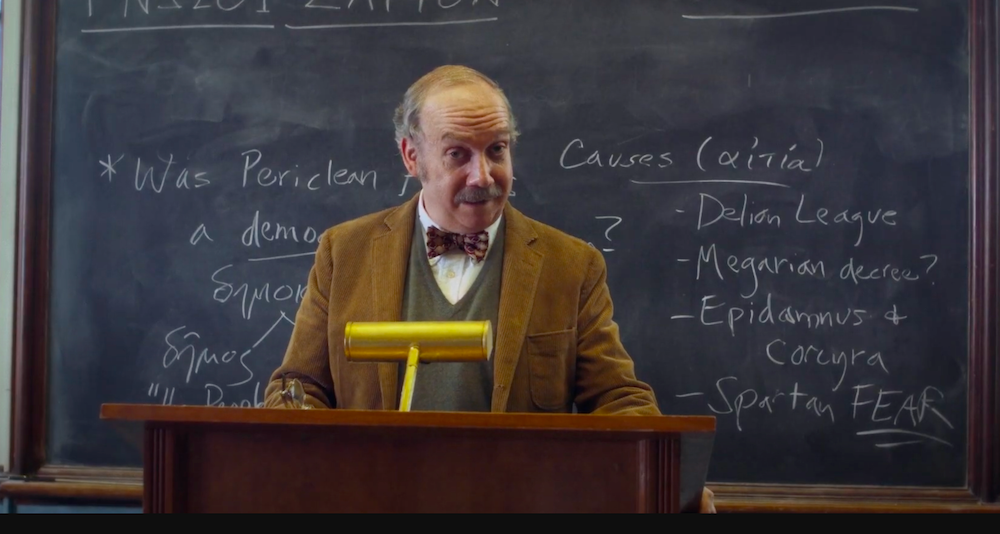In Alexander Payne’s ‘The Holdovers,’ we follow a classics teacher named Paul Hunham who prefers to keep to himself and doesn’t try to make himself lovable, even when he knows that most of the students hate him. He has a code of conduct, which he sticks to no matter what, even if it distances him from other people. However, during the Christmas break of 1970, the walls around him start to crumble as he connects with a student and discovers that they are more similar than he’d imagined. The character is brought to life by Paul Giamatti, who makes Mr. Hunham feel like a teacher the viewers would know in real life.
Paul Hunham is Partially Based on David Hemingson’s Uncle
‘The Holdovers’ comes from the mind of the screenwriter David Hemingson, who first wrote it as a pilot script and then developed it into a feature film script with Alexander Payne. Hemingson revealed that a lot of the story and characters come from his personal experiences, and he based Mr. Hunham on his Uncle Earl. After Hemingson’s parents were divorced, Uncle Earl took him under his wing, and his persona was quite similar to what we see in the movie.

Hemingson has described his uncle as a “remarkably brilliant man” who had a unique perspective on life. A WWII vet, Earl spoke six-seven languages and had worked at the United Nations. “He gave me this strange but beautiful gospel of how to approach life that was entirely his own. He had this Roman philosophy thing going on, but it collided with this deep reverence for Dickens and Thackeray. He was just this incredible raconteur who also, without a doubt, spoke in a very strange patois,” the screenwriter said, adding that a lot of profanity that Hunham uses in the movie is based on what Earl used to say.
Hemingson imagined Hunham as “ this incredibly erudite but also incredibly coarse kind of bald dude with these jug-handle ears and these Buddy Holly glasses” with an “incredible gift of rarified profanity.” At his core, however, the teacher would be, like Uncle Earl, “hard-candy shell, chewy caramel center.” When it came to casting the role, Payne only had Paul Giamatti in mind. Comparing him to the likes of Meryl Streep and Laurence Olivier, the director revealed that Giamatti knew the nerve of the character from the moment he was cast. In fact, the character was named Paul after the actor.
The Academy Award-nominated actor explained that he saw Hunham as someone he’d known when he was in school. “I went to a school like the one in the film about ten years after it takes place, and a lot of guys like him were still there at that time. They all had a schtick, and in a lot of ways, my character has built up a schticky persona. In a way, he knows he’s the pipe-smoking, corduroy guy with a tie. He’s living this ridiculous fantasy where he’s this erudite academic genius regarding the ancient world, and it’s all a schtick,” Giamatti explained.

One of the things that the actor wanted was to keep the consistency of his character. He didn’t want Hunham to suddenly become a likable person just to deliver on the expectation of a transformation. The audience had to see that the kindness and affection that he was capable of was always in him, though he also had to be consistent about the fact that even by the end, Hunham never learned to express that.
When it came to hurling innovative insults at his students, Giamatti revealed that a person like Hunham would enjoy all that. “I feel like he enjoys and really relishes the sound of his own voice when he’s delivering his insults. I think he’s got all of them sitting in the back of his head at all times because he really enjoys the art of language,” he said. And because it’s such a distinctive personality trait of his character, the actor made sure that every insult was delivered right.
With all this in mind, we can say that the character of Paul Hunham, despite being fictional, is deeply rooted in reality. The writer, the director, and the actor brought their own real-life experiences and channeled the people they knew in real life to make Mr. Hunham as realistic and believable to the audience as possible.
Read More: The Holdovers: Is Barton Academy a Real Boarding School?


You must be logged in to post a comment.